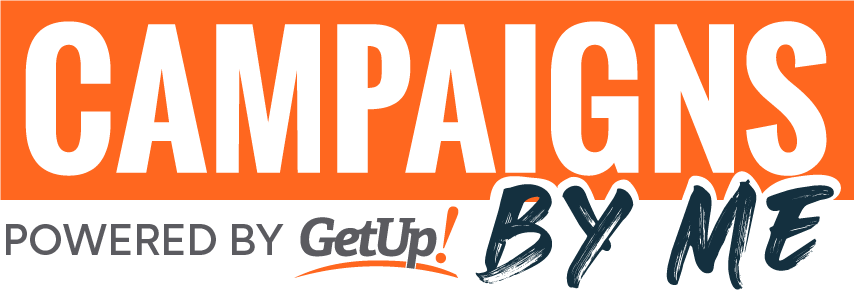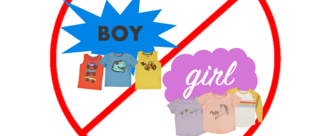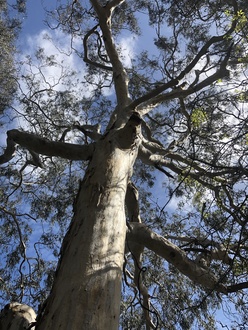-
Kmart: Replace the "boys" and "girls" clothing sections with an inclusive kids' sectionYoung children are told which colours, clothing styles and even interests they are permitted to have through the choices they have available in their respective gender’s clothing department. Many parents of young boys will tell you their son loves pink, rainbows and flowers but simply cannot wear clothes in these styles like girls do without taking them from the girls’ section, which sends them a strong message that the things they like are “wrong”. Similarly, many parents of girls lament the lack of dinosaurs, trucks, and non-frilly styles in the girls’ section. This is a problem that has already been addressed by many smaller and independent retailers, who have done away with “girls” and “boys” sections entirely, in favour of an inclusive children’s one. It is time for Australia’s biggest retailers to follow suit. Nobody really believes that boys’ interests are limited to cars, diggers, dinosaurs and sharks. Nobody honestly thinks girls only like rainbows, flowers, unicorns and ice cream. Nobody reasonably considers certain colours to belong exclusively to a certain gender. Enough. Get rid of the gender separated clothing sections, and let kids choose exactly what they like without arbitrary boundaries. _________________________ FREQUENTLY ASKED QUESTIONS ***Why can’t you just pull things from the opposite section?*** Firstly, that’s not always possible. Cut and style are issues (consider e.g. a boy who wants a colour or pattern from the girls’ section but doesn’t want the fitted cut). More importantly, having the clothes separated in the first place sends a strong message to kids that there is an appropriate or a “normal” way for them to dress based on their gender. Any child who wants to wear something from the “other” section gets a strong message that their desire is, at the very least, “weird”, and at worst, straight-out wrong. We can’t expect a young child to overcome these arbitrary barriers on their own. If we truly believe that it’s OK for boys to wear pink, and for girls to like cars and trucks, then let’s do away with two sections and let them pick exactly what they like. ***But sizing for boys and girls is different!*** What many refer to as “sizing” is really a difference in the style and cut of clothes. There is no difference at all in sizing for young children (in fact, designers use one form/mannequin for girls and boys). As they get older, children’s bodies change shape - but they change as much from each other as they do from those of the “other” gender. We are all very different from each other in our body sizes and shapes, which is why sometimes we struggle to find things that fit even though it is made for our gender. When clothes are sorted by style (e.g. fitted t shirts on one rack; box cut on another), and then by size, there is no issue in sizing at all. Consider the multitude of unisex kids’ and adults’ clothing companies (a quick google will return lots of them), who have no trouble with sizing. ***Won’t it be hard to find what I want to buy?*** Not at all! Clothing is organised by type, then by style or colour. Some shops already organise their clothes this way. So do a ton of online retailers of kids' clothing. We already organise toys by type, which used to be separated by gender. ***What do other parents think?*** Since this campaign began, parents have shared many examples of times they were frustrated with the kids' clothing options available in store - from a toddler's hat with a whale on it labelled "boys' hat", to the lack of bright colours in the boys' section, to the lack of practical, durable clothing in the girls'. ***I just want more variety; I don’t want to put both sections together.*** We agree that more variety in children’s clothing is absolutely needed generally. That is part and parcel of this campaign. Having two sections is a bit of a self-perpetuating gender loop - before designers even begin they have to choose if they're designing for the "girls" or "boys" section, which immediately limits their options and makes it more likely for them to "over-gender" the clothes. If we unify the sections we are encouraging much more variety in children’s clothes generally, and on the way we’re taking down any barriers that might cause a child to feel “wrong” for wanting clothes that previously “belonged” to the other gender. Win-win! ***Isn't it natural for girls to like e.g. pink and boys to like e.g. blue?*** No, it isn't. A hundred years ago it was the exact opposite - pink was considered "robust" and suitable for boys, and blue "softer" and appropriate for girls. Before that, parents dressed all young children in dresses - it was considered distasteful to gender them with clothing as this brought attention to their sexuality at such a young age. This all began to change in the middle of the 20th Century, largely as a reaction to male homosexuality. People believed that dressing boys like "little men" would stop homosexuality. Ha! In any case, we know that girls are not born with a love for glitter and unicorns. Similarly, infant boys show no aversion to pink, and no preference for dinosaurs over bunny rabbits. It's all made up. Why don't we let them have exactly what they like - glittery, neutral, bunnies or bulldozers?1,265 of 2,000 SignaturesCreated by Sarah Rogers
-
End the crisis in rural and remote healthNSW rural and remote health and hospital services are in crisis due to a lack of engagement with rural and remote people in decision-making, the absence of a clear strategy for rural health and accountability for rural health outcomes, and poorly targeted investments in recruiting and retaining doctors, nurses, mental health and allied health staff by the NSW Government. Rural and remote communities need the help of the NSW Government to fundamentally reform our rural and remote health and hospital system so that it is responsive to the needs of individual communities and has the resources to address the causes and consequences of poor health. People who live in rural and remote NSW have a higher rate of chronic diseases compared to people living in regional and metropolitan cities, will die up to 11 years earlier and have inadequate access to primary health care and hospital services. The median age of death of rural and remote people is going backwards, while more than 3,000 rural and remote residents in NSW die unnecessarily every year from preventable causes. Rural and remote people need a health and hospital system that is designed around their unique needs and circumstances. Metropolitan approaches has failed to deliver the right care in the right place and at the right time for rural and remote communities. Building the right health system will help is to save more rural and remote residents from ill-health, and premature and avoidable death. Rural and remote residents produce the fresh food we eat and generate more than 65% of the nation's export wealth. Access to appropriate health care is not just a human right, it is critical for the future of jobs and economic development in our country.5 of 100 SignaturesCreated by Mark Burdack
-
QCAT: People with disabilities must be able to make their own choicesUnder the NDIS framework, it encourages disabled people to make their own choices, and to take their views into consideration. It's very important to disability people and their rights.4 of 100 SignaturesCreated by Glen Taylor
-
Clean up our River systemFor 25 years now I have tried to get councils to clean up our biggest asset the Georges River. Each flood erodes more of the sandy banks due to urban spread & its diversion of run off water to the creek system that feeds the river. Trees that have been long standing face the risk of falling into the river on the next major flood & noxious weeds supplies a home for ever growing mosquito population.9 of 100 SignaturesCreated by Alan Riley
-
COURT OUT! LOVE ALL!Everybody deserves to be loved, and sport should not be a platform to support and spread misinformation and discrimination against anybody. Full recognition should be given to sportspeople who promote inclusion and love, such as Evonne Goolagong Cawley, and the arena should be renamed after her, or, at the least be called the Love All Arena. The supporters of this petition stand in solidarity with the people of Burundi, especially in the LGBTQ+ community, and people all over the world who have endured human rights abuses and persecution. COURT OUT! LOVE ALL!69 of 100 SignaturesCreated by Ant Benedyka
-
Exempt international studentsInternational students suffer terribly from the travel ban. High school students cannot go to school. University students struggle with online lessons with bad quality such as old videos which were shot years ago. We are forced to defer because of invalid internships and in-person courses. Students can learn nothing from zooming or videos. Besides, a huge portion of students do not have online classes and they have to be exempted to enter Australia and go to schools as soon as possible. Our human rights of attending school are being deprived and leads our family to horrible mental illness. We do not pay our family’s saving for video lessons or rent for house which we cannot even live in. International students contribute millions of dollars to Australia community and benefit Aussie society in various areas. We appeal exemptions for international students not only for student’s future and human right but also for the recovery of Australia economy. International students are willing to quarantine, obey any rules and pay all the fees. We are willing to quarantine in students apartments and will not take any stranded Australians’ places. Please allow international students who do not have online lessons and are at urgent to study enter Australia and continue their education on a voluntary basis.144 of 200 SignaturesCreated by Colleen Gao
-
Legalise the recreational use of cannabis in AustraliaThis unjust and immoral war on this plant has to end. Australians shouldn’t be criminalised for using a plant that is far less harmful than alcohol and tobacco. The waste of resources policing this unjust law as well as the targeting of minorities needs to end. The time has come for Australia to catch up with the rest of the world!238 of 300 SignaturesCreated by Nikos Petropouleas
-
Urgent Special General Meeting of SWALSC members to discuss SWALSC role in AHRCL activities in 2020SWALSC members and NCT beneficiaries are concerned that over $18 million of our funds and the potential future income and benefits from these funds held in trust by our professional trustee EQT have been diminished as a result of misrepresentations made by SWALSC executives and the SWALSC Governing committee. We feel that persons, organisations and trustees should be held accountable for these activities conducted in 2019 and 2020225 of 300 SignaturesCreated by Noel Morich
-
We need a Clean Recovery now!A Clean Recovery will make energy cleaner and cheaper, and create more jobs than dangerous fossil fuels like methane gas. Australia can be a clean energy superpower, proudly exporting energy from our wind, waves and sun. We can power our businesses and homes with solar, make our houses more affordable and energy efficient, and restore the natural landscapes we love. To make it a reality, we need widespread support from key politicians and community members across the country. Sign the petition for clean, affordable energy and climate-friendly jobs for people across the country.14 of 100 SignaturesCreated by Brigid Sundborn
-
Mount Alexander wants Clean Recovery now!Implementing a Clean Recovery Plan will reduce energy cost and create twice as many secure jobs than polluting and expensive fossil gas and nurture a safe climate for our children and grandchildren. Delivering a Clean Recovery will need widespread support from key federal and state politicians and concerned local communities such as ours across the country. Mount Alexander Shire Council, last year declared a Climate Emergency and has committed to a roadmap to carbon neutrality for council operations by 2025, an example to federal and state governments of results achievable with strong community support and commitment to scientific evidence based climate policy. To show your support for a responsible government climate policy please sign our petition. Will you join the call for clean, affordable energy and climate-friendly jobs?256 of 300 SignaturesCreated by Malcolm Robins
-
We need a Clean Recovery now!A Clean Recovery will make energy cleaner and cheaper, and create more jobs than dangerous fossil fuels like methane gas. Australia can be a clean energy superpower, proudly exporting energy from our wind, waves and sun. We can power our businesses and homes with solar, make our houses more affordable and energy efficient, and restore the natural landscapes we love. To make it a reality, we need widespread support from key politicians and community members across the country. Sign the petition for clean, affordable energy and climate-friendly jobs for people across the country.12 of 100 SignaturesCreated by Greta Mula
-
Hume needs a Clean Recovery now!A Clean Recovery will make energy cleaner and cheaper, and create more jobs than dangerous fossil fuels like methane gas. Australia can be a clean energy superpower, proudly exporting energy from our wind, waves and sun. We can power our businesses and homes with solar, make our houses more affordable and energy efficient, and restore the natural landscapes we love. To make it a reality, we need widespread support from key politicians and community members across the country. Sign the petition for clean, affordable energy and climate-friendly jobs for people across the country.13 of 100 SignaturesCreated by Scott McInnes












